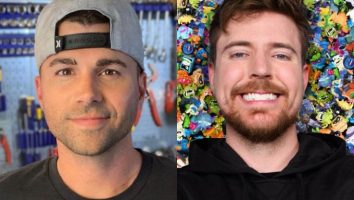A soft drink commercial is probably the last place anyone expected Davey Hansen to turn up, but the pious character from the ’60s Christian show Davey and Goliath starred in a hilarious Mountain Dew spot that aired on U.S. networks earlier this year. In the 30-second stop-frame spot from ad agency BBDO, Davey and his friend Tommy wrestle over a can of Mountain Dew. Davey’s disapproving father appears on the scene and–after Davey admits that it was wrong to fight–drinks the Dew, intoning: ‘Let that be a lesson to you.’ The commercial closes with Tommy asking, ‘What just happened here?’ and a dejected Davey responding: ‘We got hosed Tommy, we got hosed.’
Though its story line is an ironic turn from the neatly packaged moral dilemmas addressed in Davey and Goliath, the ad represents a means to an end for the Evangelical Lutheran Church in America (ELCA), which is trying to get Davey back on TV. ELCA aims to raise US$3 million to US$4 million through licensing and commercial use of the characters in order to fund production of 26 new 12-minute episodes.
But why bring Davey back now? For the same reasons the church developed the show in the first place–‘to create positive, value-oriented programming for children,’ says Reverend Eric Shafer, director of communications for the Chicago-based ELCA. ‘Especially with the terrorist tragedy last September, we think the spiritual and moral lessons Davey taught are as relevant today as they’ve ever been.’
Initially funded by US$1 million from the United Lutheran Church in America, Davey and Goliath was originally produced by stop-frame expert Art Clokey Productions (Gumby) and was distributed to 200 U.S. TV markets for free in 1960. By 1975, 65 episodes and six specials had been created, each adhering to the same formula: Davey and his dog/conscience Goliath learn about Christian morality by overcoming conflicts. Though the show only airs sporadically on small religious networks in the U.S. today, it continues to fascinate the entertainment world. Over the years, several TV shows have spoofed or referenced Davey and Goliath, including The Simpsons, Madtv and Friends.
Although no merchandise was produced during show’s initial run, in 1987, the Church granted home entertainment rights to video distributor Program Source, which has sold roughly 600,000 vids to date. While Shafer understands why fans might be uncomfortable with licensing activity–indeed, the Church deemed it blasphemous in the ’60s–the realities of financing a TV show today make it necessary.
Kitschy teen-skewing product represents the first phase of ELCA agent Heat Licensing’s Davey and Goliath merch strategy. Product from licensees National Entertainment Collectibles (talking and regular plush), Hot Properties (key chains, magnets, puzzle sets) and NJ Croce (bendable figures) should hit shelves at specialty teen retail outlets this month. Heat is now scouring for licensees to create mass-market items for the six to 12 set based on the TV concept. Open categories include puzzles, interactive, apparel, toys and games.
Despite a few modern touches, the new series will closely resemble the original, though Davey will tackle more contemporary kid problems like drugs and school violence. Heat president Patrick Lauerman feels Davey’s wholesome messages will provide a welcome alternative for parents and kids. ‘And I think giving Davey a little bit of edge, à la the Mountain Dew commercial, should endear him to tweens and teens,’ he says.
However, that doesn’t mean that licensees have carte blanche to do whatever they want with the property. ‘Companies won’t be able to create product featuring Davey or Goliath wearing horns or holding a gun,’ says Shafer, who’s still smarting from Madtv’s Davey-as-serial-killer stop-frame spoof from a few years back.
Though the ELCA is committed to financing production itself, Lauerman has been speaking to several studios about producing the project. In the interim, the Church has again tapped Art Clokes to create two 30-second Davey and Goliath spots that are designed to reacquaint the public with the property and link to ELCA’s website, where people can read up on Christianity.
It’s clear, though, that Shafer is already thinking beyond the TV series. ‘I’d love the show to become an engine to fund specials,’ he says. ‘Wouldn’t it be great to do a 30-minute special in which Davey and his friend Benjamin visit a synagogue, and then meet up with their friend Mohammed and go to a mosque? That’s a message of religious understanding that we need right now.’





















